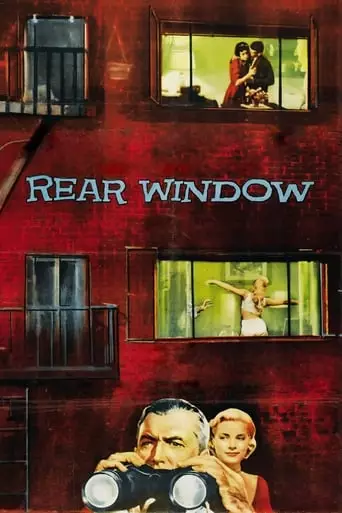
Rear Window (1954) Watch Online Free
A wheelchair-bound photographer spies on his neighbors from his apartment window and becomes convinced one of them has committed murder
Rear Window (1954), directed by Alfred Hitchcock, is a seminal work in the suspense-thriller genre, often hailed as one of the director’s greatest achievements. The film revolves around L.B. Jeffries (James Stewart), a photographer confined to a wheelchair due to a broken leg. As he watches his neighbors from his apartment window, he becomes convinced that one of them, Lars Thorwald (Raymond Burr), has committed murder. Along with his girlfriend, Lisa (Grace Kelly), and his nurse, Stella (Thelma Ritter), Jeffries embarks on an investigation that blurs the lines between voyeurism and justice.
The movie’s plot unfolds in a limited space, focusing on Jeffries’ apartment and the surrounding windows he observes. This limited perspective, confined to his rear window, plays a central role in building tension and suspense. As Jeffries watches his neighbors’ daily lives, he inadvertently becomes a voyeur, drawn into the domestic struggles and secrets of the people he watches. The primary narrative revolves around Jeffries’ suspicions of Thorwald, whose wife has mysteriously disappeared. However, the deeper narrative explores themes of isolation, curiosity, morality, and the ethics of surveillance.
The use of the confined space is a deliberate choice by Hitchcock, who turns Jeffries’ apartment into a microcosm of the broader world, highlighting the complexities of human nature through glimpses of neighbors’ lives. Jeffries’ voyeuristic observations invite the audience to consider how much of the world is hidden from view and how much of what we think we know is based on assumptions and limited perspectives.
After watching Rear Window, you will likely experience a blend of suspense, intrigue, and contemplation. The film leaves you questioning the ethics of observation and the fine line between curiosity and intrusion. You might feel a lingering discomfort about how easily we assume things about others’ lives based on limited information. The tension in the film, built through Hitchcock’s expert manipulation of perspective and timing, ensures that you remain engaged until the very last scene.
You may also find yourself reflecting on the complexity of human relationships and the ways in which we relate to one another in an increasingly isolated world. Hitchcock’s exploration of voyeurism in the age of growing media visibility is still relevant today, and watching the film might prompt thoughts on the implications of modern surveillance and the ethics of watching others without their consent. In the end, Rear Window is more than just a suspense thriller—it’s a thought-provoking exploration of human nature and the consequences of our actions.
In summary, Rear Window is a timeless classic, rich in suspense and psychological depth, offering both entertainment and profound commentary on human curiosity, morality, and the complexity of relationships.
